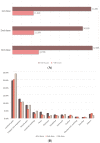COVID-19 Vaccination Status and Hesitancy among Breast Cancer Patients after Two Years of Pandemic: A Cross-Sectional Survey
- PMID: 36146608
- PMCID: PMC9503096
- DOI: 10.3390/vaccines10091530
COVID-19 Vaccination Status and Hesitancy among Breast Cancer Patients after Two Years of Pandemic: A Cross-Sectional Survey
Abstract
Background: Patients with cancer show greater susceptibility and vulnerability to severe acute respiratory syndrome coronavirus 2 infection. However, data on the vaccination status among patients with breast cancer and any structured analysis of the factors influencing patients’ decisions regarding vaccines are lacking. Methods: This cross-sectional study on patients with breast cancer in China was conducted from 1 June 2022, to 17 June 2022. Every participant completed an online questionnaire about their vaccination status and any adverse reactions, and a scale based on the Health Belief Model (HBM) to assess the vaccination status of respondents and their willingness to receive following doses or boosters. Results: Among the 1132 participants, 55.2% had received a COVID-19 vaccine. The incidence of adverse events per dose was around 40%. Vaccine hesitancy of 61.9% was observed among patients who had not fully received three doses of vaccine or boosters. The only variable found to be associated with vaccine hesitancy was time since diagnosis (p < 0.05). In the HBM scale, vaccine hesitancy was closely related to a low level of perceived susceptibility, a low level of perceived benefit, a high level of perceived barriers and a low level of agreement with doctors’ advice. Conclusions: For patients with breast cancer, perceived susceptibility, benefits and barriers should be prioritized, and the advice from authoritative doctors is a vital cue to action.
Keywords: COVID-19; adverse event; booster vaccination; breast cancer; vaccine hesitancy.
Conflict of interest statement
The authors declare that they have no conflict of interest to disclose and have no financial relationships with any biomedical companies.
Figures




References
-
- Dai M., Liu D., Liu M., Zhou F., Li G., Chen Z., Zhang Z., You H., Wu M., Zheng Q., et al. Patients with Cancer Appear More Vulnerable to SARS-CoV-2: A Multicenter Study during the COVID-19 Outbreak. Cancer Discov. 2020;10:783–791. doi: 10.1158/2159-8290.CD-20-0422. - DOI - PMC - PubMed
Grants and funding
LinkOut - more resources
Full Text Sources

